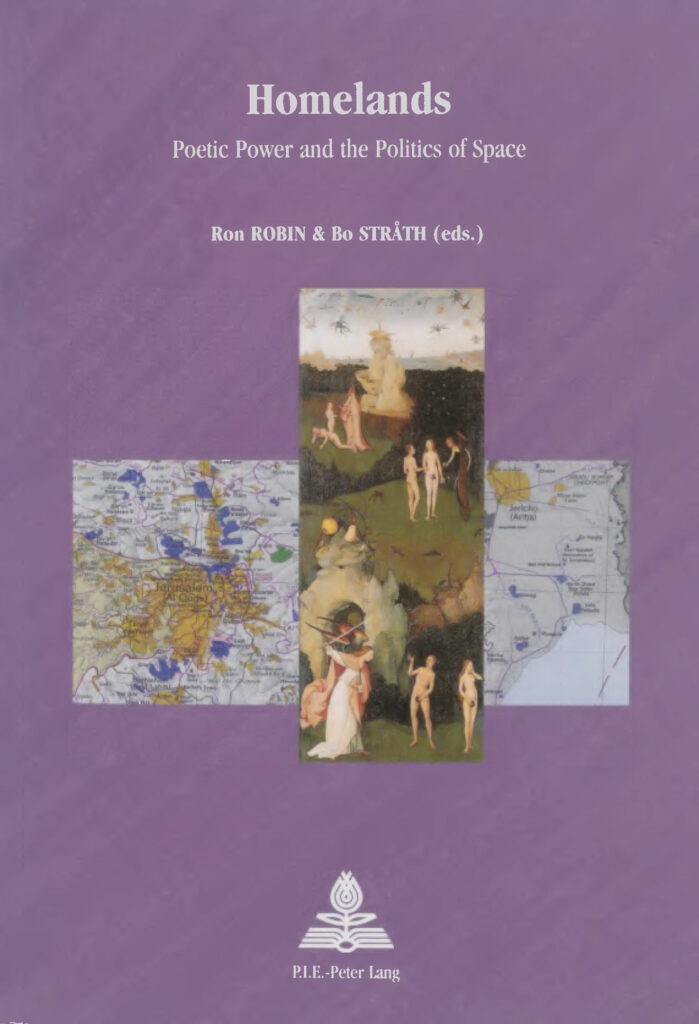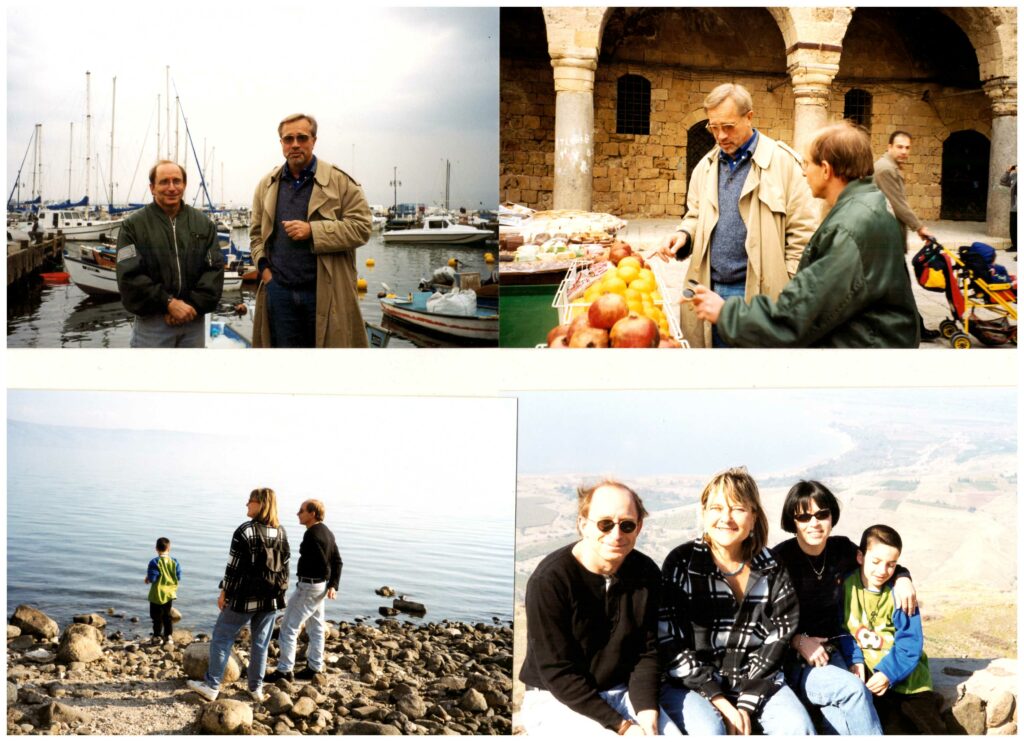Poetic Power and the Politics of Space

Ron Robin, Bo Stråth (eds.), Homelands. Poetic Power and the Politics of Space. P.I.E. Lang, Brussels 2003
The team of this book project was a group of some ten Israel and Palestinian historians, and the project’s backdrop was the Israel-Palestine conflict. The task was to explore the historical preconditions of a two-state solution to the conflict under the involvement of similar areas of contested homelands as comparative reference points, extending the team to about fifteen people. At the time of the project, the optimistic spirit after the Oslo Agreement in 1993 was shifting towards increasing anxiety that the conflict was resurging: the failure of Camp David II between Clinton, Barak and Arafat in the summer of 2000 and the beginning of the Second Intifada a few months later. The normative underpinning was to address this growing concern, and the mood within the author team was that it was possible to turn the declining optimism into hope again.
At a conference at Snogeholms Slott near Lund at the end of 1995, Georg Iggers, the Jewish German-US American historiography expert, commented in a conversation with Stråth on the murder of Jitzchak Rabin a month previously, predicting a long, long night in the Israel-Palestine relationships. Despite all concerns, this was not the Homeland team’s mood. However, soon after the publication, Stråth recalled Igger’s Cassandra prophecy.
Reflecting on the book a quarter of a century later, we know that history didn’t go as it proposed. Was it a vain project? History is or shouldn’t be to confirm that what happened needed to happen because it did happen. Good history has a message, implicit or explicit, about the future through the historian’s exploration of the past and how the future, on that basis, could or should be. The good history reflects alternative futures in the past and the present. It reflects on to what extent such alternatives were redeemed. It reflects on missed opportunities and on why they were missed. It is not a prognosis about the future but about alternatives and their historical preconditions. In that sense, the project fulfilled its purpose. Moreover, the alternative that the book implicitly suggests at a normative level is still there, a statement without any estimation of the probability of its realization.
In the retrospective view, it was Minerva’s owl project in the dusk that spread over Israel and Palestine after the murder of Rabin. However, the participants couldn’t or didn’t want to see the dusk. The question for the future at the end of 2023 is how and when the morning after the night will come. Nothing but hope motivates the question. As just stated, the alternative that the book normatively and implicitly explored is still there.
The project’s core dimension was the team’s friendly and generous mood with a clear commitment to understanding each other’s arguments and working on a shared goal. The team meeting was in Florence. There were more meetings between Stråth and Ron Robin, of course. Unforgettable is a meeting in Haifa. Ron and Livi Robin received Stråth and Angela Schenk with great hospitality, showing Haifa, Akkon, the Golan Heights, and the Sea of Galilee with its biblical sites. Stråth and Schenk then extended the trip to Jerusalem and, from there, in a rental car, to the Dead Sea and through the desert and West Jordanland back to Tel Aviv. They enjoyed the peaceful landscape and people they met without any thoughts about the Intifada. Their only concern was that the rental car was not allowed for the West Bank, but it never became a problem. Thinking back on the event breeds nostalgia, like the Damascus conference of the Global Translations project with an excursion to Palmyra in 2010, just before the war atrocities closed down Syria.

Abstract
This book historically surveys the contested poetics of space and place associated with the term “homeland” in the Middle East, Balkans, Ireland, South Africa and Germany in the nineteenth and twentieth centuries. These cases of contested homeland discourses are contrasted with a case of non-contention in Sweden. The contributors do not narrate events preceding the conflicts in these divisive areas of the world. They offer and confront representations of homeland from multiple and, at times, unusual perspectives. Ambiguity and variety are two common denominators of this very uncommon collection. These scholarly representations of homeland are saturated with the contradictions of imagination and culture. They all contain a subtext concerning the role of the nation-state and its relationships to multiple understandings of homeland in contemporary global cultures and politics. The different and sometimes incompatible opinions voiced here are bound by a common hope to affect the current discourse on nationalism,
community, homeland and exile.
Contributions by: Maoz Azaryahu, John D. Brewer, Heidi Grunebaum,
Ilan Gur-Ze’ev, Rema Hammami, Yazir Henri, James Kaye, Mark Levine,
Senadine Musabegovic, Karma Nabulsi, Issam Nassar, Fania Oz-
Salzberger, Ilan Pappe, Rolf Petri, Ron Robin, Bo Stråth, Salim Tamari
and Mariangela Veikou
Table of Contents
Preface
Introduction. Poetics of Space and Place. Ron Robin and Bo Stråth
Part I. Palestinian and Israeli Notions of Homeland
Chapter 1. Gender, Nakbe and Nation: Palestinian Women’s Presence and Absence in the Narration of 1948 Memories. Rema Hamami
Chapter 2. Bourgeois Nostalgia and Exile Narratives. Salim Tamari
Chapter 3. My Homeland. Karma Nabulsi
Chapter 4. Narrating a Homeland Identity: The Writing of the Histories of Palestinian Nationalism. Issam Nassar
Chapter 5. Holocaust/Nakbah as an Israeli/Palestinian Homeland. Ilan Gurze’ev
Chapter 6. Oh, My Land, My Homeland: Origins, Varieties and Fate of Zionist Poetics of Moledet. Fania Oz-Salzberger
Chapter 7. Homelandscapes. Zionist Landscapes of a Hebrew Homeland: Three Cases. Maoz Azaryahu
Chapter 8. Locating Home: Overthrowing Geography, Misreading Modernity and Other Adventures in the Search for the Routws that Divide Us. Mark Levine
Chapter 9. The Post-Territorial Dimensions of a Future Homeland in Israel and Palestine. Ilan Pappe
Ch 10. The Necropolitocs of Homeland. The Role of Tombs and Village Cemeteries in the Middle East Conflict. Ron Robin
Part II. Other Homelands
Chapter 11. Ambiguous Insiders and the Description of ‘Homeland’: Belonging in Immigrants’ Ethnic Identity Narratives. Mariangela Veikou
Chapter 12. The Circle and the Present. Senadin Musabegovic
Chapter 13. Where the Mountain Meets Its Shadow: A Conversation on Memory, Identity, and Fragmented Belonging in Present-Day South Africa. Heidi Grunebaum and Yazir Henri
Chapter 14. Contesting Ulster. John D Brewer
Chapter 15. The Meanings of Heimat (1850-1945). Rolf Petri
Chapter16. There’s No Place Like Home. James Kaye
Chapter 17. Hembygd as a Pragmatic Concept: The Alternative Case. Bo Stråth
References
Notes on the Contributors




































